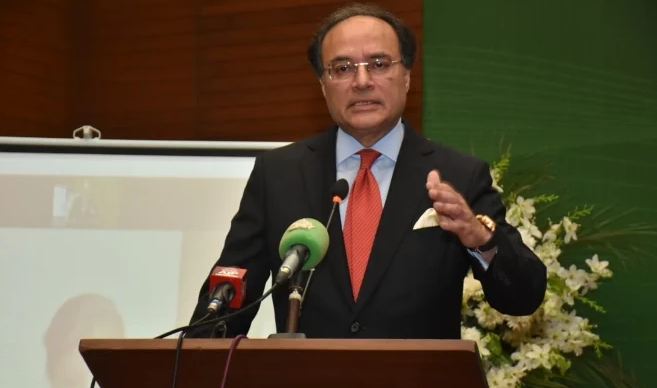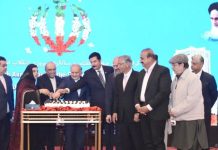KARACHI, Feb 24 (APP): Federal Finance Minister, Senator Muhammad Aurangzeb, reiterating the government’s determination to structural reforms for paving a foundation of resilient economy and sustainable growth, on Monday urged that every sector has to contribute in efforts for export-led growth.
He expressed these views while addressing the inaugural session of 2-day Pakistan Banking Summit 2025 and later talking to the media. The maiden banking summit is being organized by Pakistan Banks Association to promote collaboration among the industry leaders and foster integration into the global banking spectrum.
Senator Muhammad Aurangzeb said that the incumbent government had taken arduous decisions which resulted in a significant progress in macroeconomic stability depicted by improvements in key economic indicators like current account balance, inflation and stock market.
The government is implementing an agenda of fundamental reforms for sustainable economic stability in various sectors, he said while referring to reforms in FBR, fiscal prudence, restructuring and rightsizing of public sector entities and governance structure as well as energy and other important sectors of the economy.
Further elaborating the government’s reform agenda, he said that the ministry of finance is being engaged in tax policy formation, as tax policy should not be limited only to mathematical calculations but it should also take the economic value in consideration.
The government is introducing appropriate reforms and we will not give in, he categorically stated and vowed to take forward the reform agenda with the same spirit. “Pakistan needs to transform the DNA of its economy and move towards sustainable and inclusive growth,” he argued.
We are heading in the right direction and all these factors are boosting the confidence of investors in the national economy as well, he said and emphasized, but we need sustainability and resilience to face the emerging challenges.
The finance minister also appreciated provincial governments for legislation regarding agriculture income tax and said that it was a remarkable structural reform and a milestone in the history of the country.
The government is vying to relaunch the privatization process of PIA while measures were underway for reducing the expenditure of federal government, he stated adding that a cabinet committee was reviewing rightsizing measures in a phased manner and recommendations were being presented to the cabinet.
The finance minister termed the population growth and climate change as two major challenges for Pakistan which are adversely affecting the resilience and sustainable growth. He informed that Pakistan is building a 10 year country partnership with the World Bank with focus on key sectors including population growth, climate change and fiscal discipline.
He said that this year the government has started consultation on the budget making process at an early stage so that feed back and suggestions of all the stakeholders could be incorporated in the budget. He also invited the business and industrial communities to join the finance ministry’s advisory board for ensuring their input in the policy making process.
He underscored the vital role of the business community in sustainable growth and said that we have to evolve ourselves to become resilient against the boom and bust cycles. The growth has to be export-led and not limited only to the textile sector and every sector and segment of the economy should contribute in export enhancement, he maintained and assured that the government will extend every possible support to promote competitiveness and export oriented investments.
Aurangzeb highlighted the key role of the banking sector in growth and documentation of the national economy and stressed the banks to focus on provision of financing to SMEs, agriculture, livestock, dairy, and other priority sectors.
He also appreciated the PBA’s initiative of banking summit and hoped that it would prove an inclusive platform to discuss the challenges and solutions.
Responding to a media query the finance minister informed that a team of the International Monetary Fund is arriving on the day to review climate finance measures while another IMF team is scheduled to visit Pakistan in the first week of March for the half yearly review.
Chairman PBA and CEO Bank of Punjab Zafar Masud, earlier in his opening remarks, highlighted the aims and objectives of the summit and said that the banking sector is the largest tax collector on behalf of the FBR while it has become the largest tax paying sector of the country as well.
He also highlighted the substantial improvements in cashless economy and financial inclusion as well as PBA’s role in framing the PIA restructuring plan and cross bound collaboration for FBR data collection.
The PBA chairman urged the transition of agriculture and SME sectors to the formal economy and said that it would expand their access to banking and financial opportunities.

















